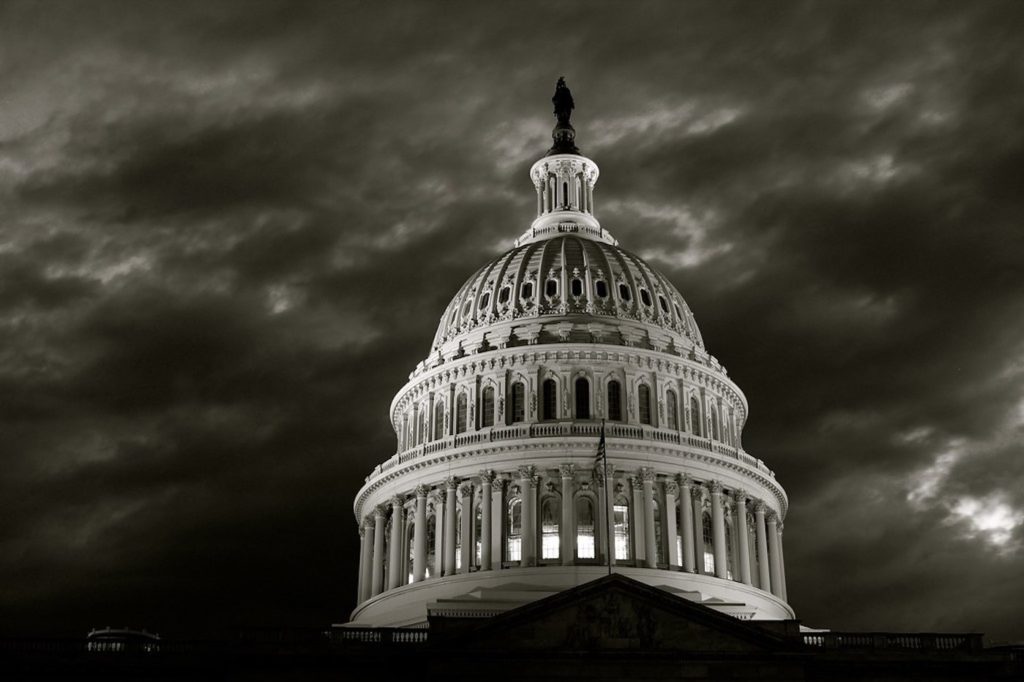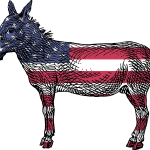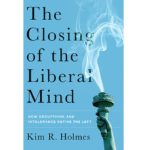Reports of the death of liberalism have been greatly exaggerated, but they are not wholly unwarranted. In A World after Liberalism: Philosophers of the Radical Right (2021), Matthew Rose provides an essential introduction to the thought of five foundational thinkers of the radical right: Oswald Spengler, Julius Evola, Francis Parker Yockey, Alain de Benoist, and Samuel Francis. Each thinker assailed liberalism in the twentieth century while the rest of the right celebrated its postwar triumphs.
Today, there are whispers on the right of a postliberal world, amplified by a new generation of radical right thinkers wielding influence on social media and among dissenting academics. The radical rightist thinkers Rose profiles sometimes propose revolting political alternatives to liberalism. But their critiques—while often lacking in intellectual rigor, excessively concerned with race and nationalism, and strangely utopian—occasionally ring true. They are worth reading because they have captured something disquieting about liberalism’s deterioration over the past few decades.
If liberalism is to be saved, its salvation will not come by averting our eyes from its enemies and critics. Rather, we must confront and learn from their incisive diagnoses of liberalism’s failures while resisting or moderating their harsh remedies. A World after Liberalism is an invaluable book for precisely this reason.
The Radical Rightist Critique of Liberalism
Start your day with Public Discourse
Sign up and get our daily essays sent straight to your inbox.The thinkers Rose engages are “radical” because they seek a postliberal theoretical basis for politics, often through revolutionary means. They are “right” because, broadly speaking, they aim to situate postliberal politics in tradition, order, authority, and community. Their visions of postliberal politics differ widely, but they find common ground in their attempts to make sense of the failures of liberalism, especially the failures of the liberal right.
Radical rightists contend that liberalism is false because humans are not sovereign individuals capable of determining their own highest good. Instead, humans inherit meaning through unchosen obligations that teach them to live virtuous lives. In the absence of obligations enforced by authority, Western nations are destined to become cultural and spiritual wastelands where lost souls are liberated from nature, family, law, God, and community.
Most radical rightists believe that forms of mainstream conservatism that defend individual liberty, limited government, and free trade have intensified liberal decadence rather than staving it off.
Most radical rightists believe that forms of mainstream conservatism that defend individual liberty, limited government, and free trade have intensified liberal decadence rather than staving it off. Preventing Western civilization’s decline into barbarism requires illiberal authorities—not merely conservative liberals—who promote standards of excellence, national solidarity, cultural identity, and the public good, even at the expense of individual liberty. Readers of A World after Liberalism will therefore be struck by how far the far right are from the mainstream right. But they will be absolutely bowled over by how close the far right sometimes come to the far left. The political spectrum is not a straight line, but rather a circle where ends often meet.
Spengler on Western Decline
The first thinker Rose profiles is Oswald Spengler (1880–1936), best known for his two-volume work, The Decline of the West (1918, 1922). Spengler held that Western national identities were becoming increasingly fractured in the twentieth century. He predicted that the developing world would challenge the West for supremacy as it began to adopt Western science and technology.
Spengler argued that the unity and purpose of Western culture’s technological revolution was being fatally compromised by its own success. Once unique, Western culture had become multicultural: an incoherent culture of many cultures whose diversity diluted its identity and dissolved its civilizational destiny. He predicted a future of Western decline that would come through democratic Caesarism, growing racial animosity, and environmental crises. He believed that the West must reassert control over its destiny by, among other things, halting immigration.
Rose calls Spengler “the prophet” of the radical right for his prescient account of the challenges Western culture would soon face, but he criticizes him for his narrow claim that cultural destiny alone shapes human thought and the human future.
Evola on Tradition and Ritual
Julius Evola (1898–1974), the second thinker profiled in A World after Liberalism, intensifies Spengler’s notion of the absolute sovereignty of tradition. Evola is author of Revolt against the Modern World (1934), a book that Rose says has enjoyed “cult-like status” since its publication. Evola criticized liberalism for overestimating the capacity of human beings to choose suitable authorities under which to live. In his view, a world of freedom and equality is a world bereft of meaning because it is a world in perpetual moral motion.
Evola argued that modern liberal society desacralizes human life, robbing it of the spiritual significance it possessed in earlier eras when work, politics, sex, family, and leisure were saturated with traditional significance, ordered by ritualistic repetition, and sustained by an unchanging spiritual realm. Evola claimed that liberalism, socialism, and communism all seek to liberate human beings from illiberal constraints that cultivate virtue.
Liberalism, socialism, and communism all seek to liberate human beings from illiberal constraints that cultivate virtue.
Rose dubs Evola “the fantasist” of the radical right because he envisioned a seemingly utopian modern world where tradition could still be sovereign, meaning could be absolutely fixed, and every activity could be regarded as holy. Making Evola’s vision a reality would require destroying the modern world and paving the way for a new dark age of global anti-enlightenment, mysticism, and spiritual fascism.
Yockey on Cultural Renewal
Francis Parker Yockey (1917–1960) is perhaps the most obscure of the rightist thinkers Rose profiles. Only 200 copies of his two-volume work Imperium (1948) were printed under the pen name Ulick Varange during his lifetime. A spiritual sequel to Spengler’s The Decline of the West, Yockey’s book argued that the most important battle of the Second World War was not waged for military supremacy, but for the soul of Western civilization. Like other thinkers of the radical right, Yockey placed liberalism and communism on the same side of the spiritual conflict.
On the opposing side he erected an idealized fascist and economically socialist state that he believed would save the West from liberalism’s moral apathy and communism’s spiritual emptiness. It would provide salvation by producing artistic and scientific geniuses whose works could ennoble the lives of common people and inspire them to national and spiritual greatness. Cultural domination and vitalism were the means and ends of politics.
Rose calls Yockey “the anti-Semite” of the radical right because Yockey alleged that Jewish intellectuals such as Sigmund Freud and Karl Marx had quietly implanted into Western culture seeds of self-critique and self-hatred. Yockey’s fervent anti-Semitism makes it difficult to take him seriously, but Rose is right to argue that those concerned with liberalism’s future must reflect on his theory of cultural sovereignty.
De Benoist on Democracy and Nature
Like Yockey, Alain de Benoist (1943–) purports to be a guardian of culture. He is the intellectual guiding light of European “identitarianism,” a far-right movement that aims to protect European cultures from being transformed by immigration and foreign spiritual influences. His thought is animated by a fixation with human difference and paganism.
Yockey believed that the arrival of Christianity in early Europe was destructive because it placed the highest human values in a spiritual realm beyond local communities and the natural world. Paganism, by contrast, roots human values in communion with the natural world from which communities derive their nourishment and sense of place. Tradition derived its authority from association with nature and neighbor rather than a universal Christian claim on the human soul.
Just as Christianity dissolved the pagan bonds of nature, liberalism dissolved the ancient bonds of “folk democracy.” It treated human beings as sovereign individuals rather than as members of a people with a coherent identity. It also failed to acknowledge that we exist in a world of unchosen (and hence illiberal) familial and communal relationships. We have deeply rooted identities that liberalism and Christianity erode by making us more identical rather than more identitarian.
Rose argues that Benoist, whom he calls “the pagan” of the radical right, is worth studying because of his strong influence on the identitarian youth movements currently sweeping through Europe. His criticism of Benoist is powerful. Like other figures of the radical right, Benoist seems to hold that the authority of culture can be strengthened when culture as such is held to be relative. At the same time, he proposes an absolute theory of cultural identity that challenges the cultural pluralism he elsewhere propounds.
Francis on Conservative Populism
Samuel Francis (1947–2005) is the final and most influential thinker profiled. A former advisor to Patrick Buchanan, he wrote his magnum opus, Leviathan and Its Enemies, in 2005, but it was left unpublished until 2016 when it gained popularity on the American right. He was a critic of American conservatism who sought to become its savior.
American conservatives had won elections, but had failed meaningfully to counter the left in the contest to capture American institutions.
Central to his criticism was his contention that American conservatives had won elections, but had failed meaningfully to counter the left in the contest to capture American institutions, including government, media, entertainment, and business. In his view, American conservatism needed a platform of national populism to expose growing class divisions, recapture its base, and leverage political power to seize cultural and political institutions.
Francis argued that conservatives could reinvigorate their movement by making an appeal to the millions of “middle American radicals” whom the elite had overlooked. To achieve this goal, he hoped to enshrine the GOP as the party of white voters in order to turn identity politics against itself. Throughout his career he harbored inane views about race, lobbying against a national holiday for Martin Luther King Jr., writing biblical defenses of slavery, and peddling crackpot theories of race essentialism.
Rose suggests that Francis is worth studying despite his abhorrent views of race because parts of his thought have found a second life in contemporary right-wing populism. He dubs Francis “the nationalist” of the radical right and observes that Francis was a critic of managerial liberalism who was himself a managerial operative for much of his career.
The Christian Question
In the concluding chapter, Rose dives deeper into the radical right’s criticisms of Christianity and confronts those who advocate not only a postliberal world, but also a post-Christian one. He explains that thinkers on the radical right criticize Christianity for its compatibility with, and support for, both liberalism and secularism.
Rose explains that radical rightists see Christianity as a caustic force that weakens non-Christian traditions by persuading communities to trade their unique histories and traditions for the Christian idea of universal equality under God. They see a post-Christian West as desirable because it is the gateway to a post-liberal West where identitarianism (to say nothing of authoritarianism) can flourish again.
Against this view, Rose argues that early Christian thinkers saw Christians as a race of people with a shared kinship and background. Christianity at its origins, in other words, was a binder of peoples and sustainer of cultures that responded more effectively to the human needs for community and tradition that radical right theorists value. He calls on contemporary Christians to revive an earlier vision of Christianity as a close-knit community of many races and peoples who, despite their outward differences, share a transcendent ethnic solidarity.
While this is an interesting and even tantalizing suggestion, Rose declines to spell it out in the detail it demands, saying only that doing so would require another book. Indeed, if his engrossing and informative book has a flaw, it is that readers do not see as much of him in it as they might like. In addition, he does little to put rightist thinkers into dialogue with one another or to explore their similarities and differences.
Overall, though, Rose has done laudable and careful work making the thought of the radical right accessible. Those seeking to make sense of the rise of the far right, and those concerned with the preservation of liberalism and Western culture, should absolutely read A World after Liberalism. It joins Mark Sedgwick’s Key Thinkers of the Radical Right (2019), and George Hawley’s Right-Wing Critics of American Conservatism (2016) as an essential volume on this often odious but increasingly relevant subject.














